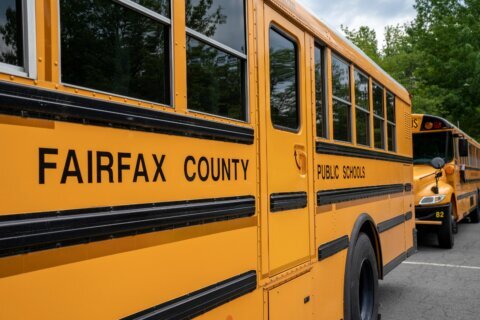Weeks before talk of masks and stay-at-home orders, Fairfax County Public Schools Superintendent Scott Brabrand suspected what at the time was called the novel coronavirus had the potential to severely disrupt Virginia’s largest school system.
In Jan. 2020, a delegation from Wuhan, China, arrived in the D.C. region planning to visit one of the county’s middle schools. Brabrand and his team scrambled, wondering whether to invite the kids on campus as planned, because they had already landed and spent time in New York City. Before deciding, school system leaders recommended seeking feedback from parents.
The middle school’s principal hosted parents over morning coffee, and a huge crowd attended, Brabrand said. Parents said they were excited for the students to gather together, but were nervous about reports coming out of Wuhan about the severity of the virus. Some of the parents identified themselves as Chinese immigrants, and begged the principal to cancel any meeting among students.
The group from Wuhan stayed at a hotel in D.C. and toured the city, but after the circumstances made their way to Brabrand, he suggested keeping the students apart. At that point, Brabrand said, it was evident the virus would become something school officials would have to think about.
Within a month, Virginia’s largest school system canceled international field trips. By early March, it canceled all field trips. And then it took what it expected would be a two-week pause.
Brabrand, who was hired as superintendent in 2017, concludes his five-year stint Thursday, when Michelle Reid is scheduled to take the oath of office and serve as his successor. On Friday, he’ll become the executive director of the Virginia Association of School Superintendents.
Among many topics in a wide-ranging interview with WTOP, Brabrand discussed how his tenure, which aimed at improving diversity among school staff and working to improve student outcomes, was interrupted by a pandemic that Brabrand called — next to school integration — the biggest event to impact public education in its history.
“It was a tough time,” Brabrand said of the pandemic. “Our country was founded on life, liberty and the pursuit of happiness. The pandemic was a great debate about life and liberty — whose life versus whose liberty. We were trying to decide collective risk for our entire community and COVID versus individual risk for an individual person to return during COVID.”
In the exclusive interview, Brabrand also addressed hiring challenges, said the county should have improved communication during the pandemic, and doubled down on the importance of the changes he oversaw to the admissions process at Thomas Jefferson High School for Science and Technology.
‘Behind the times’
At the time school systems started transitioning to virtual learning in the spring of 2020, Brabrand said, all Fairfax County high school students already had laptops. The school board approved funding for that initiative the year before the pandemic.
But the county’s technology systems, he said, “hadn’t been stress-tested as well as they needed to be.”
The county had old technology, and its infrastructure for video calls was “behind the times,” Brabrand said.
Students and parents had trouble logging in, and the school system was forced to cancel classes. On April 22, 2020, Maribeth Luftglass, the school system’s top tech official, who had worked in the county since 1999, resigned.
The county changed vendors for the start of the 2020-2021 school year, and Brabrand hoped to get most students back in the classroom before winter break. But then COVID-19 cases spiked, and with the rollout of the first COVID-19 vaccines still weeks away, Brabrand said he decided it wasn’t worth the risk.
“The reality is, were we prepared to have this go completely all virtual? It’s clear, the record shows we weren’t,” Brabrand said. ” … It was, in my hands, the life and death of 180,000-plus kids, and by extension with their families, a couple million people. I still look back. I wish we’d gotten [back in person] a little bit earlier.”
Christy Hudson, with the Fairfax County Parents Association, described Brabrand’s tenure as a “mixed bag,” largely because of the pandemic.
“FCPS did not lead the pack in reopening, or really their response to virtual learning, or anything surrounding the pandemic learning,” Hudson said. “Unfortunately, that is what he will most be remembered as.”
Sue Zoldak, who started the group Do Better FCPS, said the ending of Brabrand’s tenure “is the obvious outcome of a plethora of missteps beginning in March of 2020.”
Brabrand acknowledged communication during the pandemic should have been better.
“We all, collectively, could have done a better job communicating, and we politicized the pandemic and we politicized medicine,” Brabrand said. “And we’ve unfortunately politicized too much of public education. The pendulum is going to slowly but surely swing back.”
In an effort to help students catch up, the county has offered free virtual tutoring and funded a pilot tele-mental health program in its most recent budget.
Brabrand said he thinks spring test scores are going to be better than expected, and said a silver lining of the pandemic was “more people understood that mental health is not a bad word.”
“Real gains have been made,” Brabrand said. ” … We had record attendance at football games. We had record homecoming dance attendance. Why? Because the kids wanted to be back. They wanted to connect. And the sense of community is even stronger. Kids, maybe all of us, took for granted the power of public schools to pull everybody back together.”
Kimberly Adams, president of the Fairfax Education Association, said in a statement: “Dr. Brabrand had the task of decision-making to keep everyone safe while moving our system forward. He did his best to take care of both students and staff. We knew no matter what he did or said, nothing was going to be the right answer for everyone.
Over five years, Dr. Brabrand has advocated and received full funding for our school budget needs. This year our fully funded budget includes a step increase and a 4% MSA for employees.”
‘History will prove us well’
In 2020, the school system changed its admissions policy for Thomas Jefferson High School for Science and Technology, often recognized as one of the best public high schools in the country. The changes eliminated a $100 application fee and did away with the merit-based admissions process previously used.
The new application process also eliminated a standardized test and considered course loads and problem-solving skills, in addition to the socioeconomic status of an applicant, with the goal of improving diversity.
The group Coalition for TJ filed a lawsuit, claiming the admission policy discriminated against Asian Americans. A District Court judge agreed, but the Supreme Court in April said the admissions policy can continue to be used while the school board appeals the lower court ruling.
Brabrand said the changes are not about discrimination, but rather about “bringing everybody to the table — all groups of all walks of life, of all ethnicities.”
Some middle schools in the county had never had a student admitted to the school, Brabrand said.
“The board ultimately came to a decision that I think history will prove us well,” he said. “We have the Fourth Circuit that will be making a decision, I think, sometime in the fall.”
School Board member Abrar Omeish said the decision to appeal the court’s ruling represents Brabrand’s “can-do attitude” that helped him lead the county.
“It’s very difficult to navigate the cultural, racial, class — you name it — diversity kinds of dynamics and identity politics that our country is struggling with across the board,” Omeish said. “His goal was always to do the right thing.”
‘Great reflection’
At the start of Brabrand’s term in 2017, he said, 25 schools in the system didn’t have a single Black educator. Now, that number is down to three.
The percentage of hired Asian, Black and Hispanic teachers has increased, according to a report shared with the school board earlier this month. The county’s actions to increase diversity of qualified applicants are having a positive impact, the report found.
Among the actions taken is funding an initiative that aims to recruit male teachers and teachers of color. A $500,000 investment in the program was included in the fiscal 2023 budget.
A finalist for a principal job, Brabrand said, recently “shared growing up in Maryland, to be the only person of her ethnic background in the school and how isolating it was — except in the lunchroom, [where] she saw one person who looked like her. That was the highlight of her day. We can’t underestimate the power of kids to want to see role models.”
Separately, Brabrand said, retirements and resignations among staff went down “by over half” in 2020, and he said numbers were low the following year, too. This year, numbers are back to pre-pandemic levels, he said.
“We’ve had a great reflection,” Brabrand said. “A lot of people who were probably going to leave anyway hung on during the pandemic and left, and so you’re seeing a bit of a blip. How do we get everybody to fall in love with [the] public education I fell in love [with] 30 years ago? We do need to reignite the spark.”
‘Like a dream’
Brabrand was working with a telecommunications company in the 1990s when he spent an hour each week teaching English to English-language learners in an Oakton High classroom. From the first session, he said, teaching was “like a dream.”
Brabrand went through a career-switcher program and took an internship with the county school system before becoming a teacher, assistant principal, principal and later superintendent of schools in Lynchburg.
Now, Brabrand will lead the Virginia Association of School Superintendents, which oversees the state’s 133 superintendents. He said he aims to bring the same passion discovered in that Oakton classroom to the task of supporting state leaders.
He said he wants to help Virginia’s school leaders “make sure they fall in love and stay in love with being a superintendent, which is an extremely hard job. During the pandemic, many people thought superintendents across the country were in a no-win situation. No matter what you did, it was going to be tough. We’ve got to make sure we continue to attract and retain great superintendents in Virginia and across the country.”








